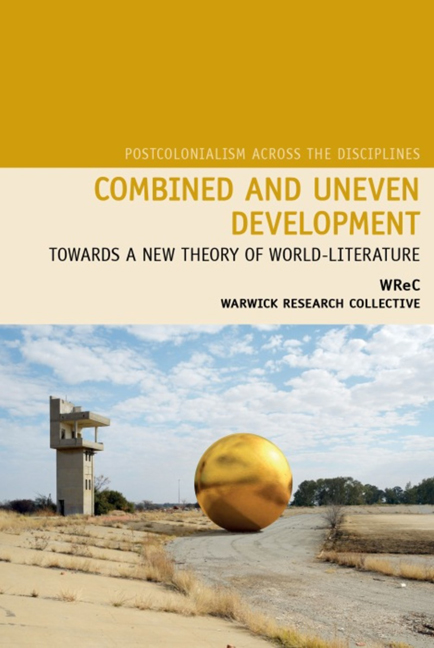Book contents
- Frontmatter
- Dedication
- Contents
- A Note on Collaborative Method
- 1 World-Literature in the Context of Combined and Uneven Development
- 2 The Question of Peripheral Realism
- 3 ‘Irrealism’ in Tayeb Salih's Season of Migration to the North
- 4 Oboroten Spectres: Lycanthropy, Neoliberalism and New Russia in Victor Pelevin
- 5 The European Literary Periphery
- 6 Ivan Vladislavic: Traversing the Uneven City
- Works Cited
- Index
1 - World-Literature in the Context of Combined and Uneven Development
- Frontmatter
- Dedication
- Contents
- A Note on Collaborative Method
- 1 World-Literature in the Context of Combined and Uneven Development
- 2 The Question of Peripheral Realism
- 3 ‘Irrealism’ in Tayeb Salih's Season of Migration to the North
- 4 Oboroten Spectres: Lycanthropy, Neoliberalism and New Russia in Victor Pelevin
- 5 The European Literary Periphery
- 6 Ivan Vladislavic: Traversing the Uneven City
- Works Cited
- Index
Summary
The way we imagine comparative literature is a mirror of how we see the world. (Franco Moretti 2003: 81)
These are testing times for literary studies. The challenges confronting the discipline today are legion and multiform; they range from the field specific to the institutional, from the university to the wider spheres of politics and the economy. In addition to internal debates about the coherence and sustainability of the established forms of disciplinary literary studies, we might reference in this connection the ongoing subordination of culture generally to the laws of the market, the apparently declining significance, relatively speaking, of literature itself as a cultural form, and the steady assault on the autonomy of the humanities – and indeed of the university itself in its historical guise as, for better and worse, an ivory tower, a ‘world apart’ – by government, business and media regimes, all bent in their various ways on incorporation, control and instrumentally defined regulation.
The suggestion that literary studies is in crisis has been made before, of course. As long ago as 1981, for instance, Raymond Williams argued that English literary studies had stumbled into incoherence – on the one hand, because the idea of ‘literature’ no longer provided a stable evidentiary basis of study; on the other, because the connotations of ‘English’ were so densely problematical. Asking whether the ‘English’ in ‘English literary studies’ identified ‘the language or the country’, Williams wrote that ‘[i]f it is the language, there are also fifteen centuries of native writing in other languages: Latin, Welsh, Irish, Old English, Norman French.
In the 30 years since that Cambridge-centred ‘crisis in English Studies’, arguments as to the instability – indeed, on Williams's reading, the strict unviability – of disciplinary literary studies overall have been sounded with increasing resonance. Scholars in the field have been proposing that the received modes of procedure are in need of radical overhaul. Everywhere today, the institutionalised and consolidated methods, the structuring premises and principles, the coherence of the disciplinary object of study itself, are being challenged and opened up to reconsideration and sometimes searching and fundamental critique.
- Type
- Chapter
- Information
- Combined and Uneven DevelopmentTowards a New Theory of World-Literature, pp. 1 - 48Publisher: Liverpool University PressPrint publication year: 2015



